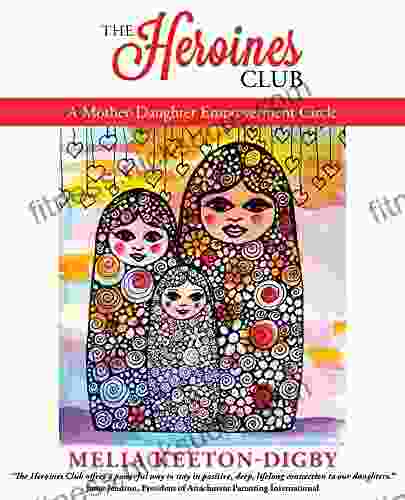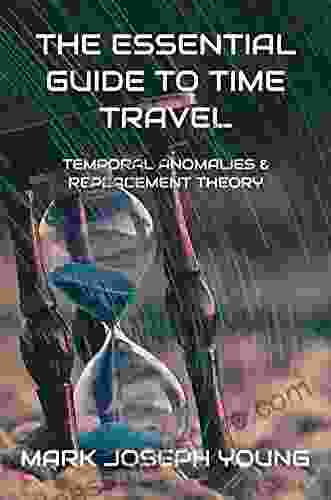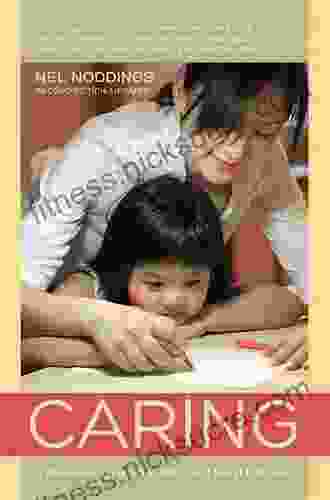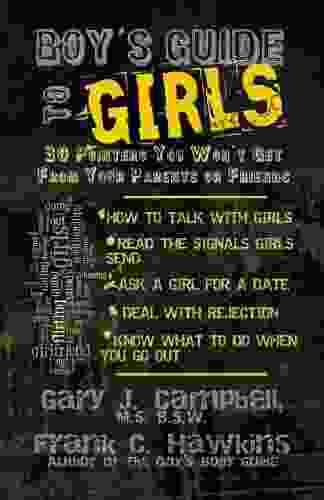Relational Approach to Ethics and Moral Education: Fostering Empathy, Connection, and Ethical Decision-Making

The relational approach to ethics and moral education is a philosophical and pedagogical framework that emphasizes the importance of relationships and interconnectedness in ethical decision-making. This approach views individuals as relational beings, whose identities and values are shaped by their interactions with others. It recognizes that our ethical responsibilities are not merely to ourselves, but also to our families, communities, and the broader society.
4.4 out of 5
| Language | : | English |
| File size | : | 923 KB |
| Text-to-Speech | : | Enabled |
| Screen Reader | : | Supported |
| Enhanced typesetting | : | Enabled |
| Word Wise | : | Enabled |
| Print length | : | 258 pages |
| Lending | : | Enabled |
The relational approach to ethics has its roots in the work of philosophers such as Nel Noddings, Carol Gilligan, and Martha Nussbaum. These thinkers argue that traditional ethical theories, which focus on abstract principles and individual rights, fail to adequately account for the importance of relationships and emotions in moral decision-making.
Principles of the Relational Approach
The relational approach to ethics is based on the following core principles:
- Relationships are central to human existence and moral development. Our identities, values, and sense of self are shaped by our interactions with others. Ethical decision-making should take into account the impact of our actions on our relationships and the broader community.
- Empathy and compassion are essential moral virtues. The ability to understand and share the feelings of others is crucial for making ethical decisions. We must be able to put ourselves in the shoes of others in order to understand their perspectives and needs.
- Responsibility is a key ethical obligation. We have a responsibility to care for ourselves, our loved ones, and our communities. This responsibility includes both acting in ways that promote well-being and avoiding actions that cause harm.
- Moral decision-making is a complex and ongoing process. There is no simple formula for making ethical decisions. We must consider the specific context of each situation, weigh the potential benefits and harms of our actions, and seek guidance from our values and relationships.
Implications for Moral Education
The relational approach to ethics has significant implications for moral education. Traditional approaches to moral education often focus on teaching abstract principles and rules. However, the relational approach emphasizes the importance of experiential learning, relationship-building, and the development of empathy and compassion.
Moral education based on the relational approach should include the following elements:
- Opportunities for students to engage in meaningful relationships with their peers, teachers, and family members.
- Experiences that foster empathy and compassion, such as service-learning projects and role-playing activities.
- Discussions about the ethical implications of real-world issues, such as poverty, discrimination, and environmental degradation.
- Opportunities for students to reflect on their own values and beliefs, and to develop a personal moral code.
Benefits of the Relational Approach
The relational approach to ethics and moral education offers a number of benefits for students, including:
- Enhanced empathy and compassion.
- Increased understanding of the ethical implications of their actions.
- Improved decision-making skills.
- Stronger relationships with peers, family members, and community members.
- A lifelong commitment to ethical behavior.
The relational approach to ethics and moral education provides a valuable framework for understanding the complex nature of ethical decision-making. By emphasizing the importance of relationships, empathy, and responsibility, this approach can help students develop the knowledge, skills, and values necessary to make ethical choices throughout their lives.
As we face the challenges of the 21st century, the relational approach to ethics is more important than ever. In a world that is increasingly interconnected, we need to find ways to bridge divides, build relationships, and promote empathy and compassion. By embracing the relational approach, we can create a more just and sustainable world for all.
4.4 out of 5
| Language | : | English |
| File size | : | 923 KB |
| Text-to-Speech | : | Enabled |
| Screen Reader | : | Supported |
| Enhanced typesetting | : | Enabled |
| Word Wise | : | Enabled |
| Print length | : | 258 pages |
| Lending | : | Enabled |
Do you want to contribute by writing guest posts on this blog?
Please contact us and send us a resume of previous articles that you have written.
 Fiction
Fiction Non Fiction
Non Fiction Romance
Romance Mystery
Mystery Thriller
Thriller SciFi
SciFi Fantasy
Fantasy Horror
Horror Biography
Biography Selfhelp
Selfhelp Business
Business History
History Classics
Classics Poetry
Poetry Childrens
Childrens Young Adult
Young Adult Educational
Educational Cooking
Cooking Travel
Travel Lifestyle
Lifestyle Spirituality
Spirituality Health
Health Fitness
Fitness Technology
Technology Science
Science Arts
Arts Crafts
Crafts DIY
DIY Gardening
Gardening Petcare
Petcare Dan Jenkins
Dan Jenkins Sir E A Wallis Budge
Sir E A Wallis Budge John G West
John G West David G Alciatore
David G Alciatore Margaret Starbird
Margaret Starbird Joshua Coleman Phd
Joshua Coleman Phd Paige Wolf
Paige Wolf Mark Harris
Mark Harris David Armitage
David Armitage Natalie Angier
Natalie Angier Guy Hunter Watts
Guy Hunter Watts Peter Stark
Peter Stark Peter D Rogers
Peter D Rogers David Travis
David Travis Frank Amthor
Frank Amthor Penny Armstrong
Penny Armstrong Richard H Coop
Richard H Coop Joshua R Eyler
Joshua R Eyler Elan Golomb
Elan Golomb Kimberly V Garner
Kimberly V Garner Phillip Starr
Phillip Starr Carlton Kirby
Carlton Kirby Roland Huntford
Roland Huntford Joe Dolio
Joe Dolio Alexey Zimarev
Alexey Zimarev Keisuke Andrew
Keisuke Andrew Daniel Young
Daniel Young Tom Mackie
Tom Mackie Stephanie Mitchell Cnm Msn Dnp
Stephanie Mitchell Cnm Msn Dnp Alfred North Whitehead
Alfred North Whitehead Wendy Currie
Wendy Currie Alexia Leachman
Alexia Leachman Erika Rogers Holland
Erika Rogers Holland Corky Pollan
Corky Pollan Mark Rippetoe
Mark Rippetoe Vishal Sambharya
Vishal Sambharya Steve Parker
Steve Parker Pantea Kalhor
Pantea Kalhor David Maidment
David Maidment Paul Wilmott
Paul Wilmott Susan Wise Bauer
Susan Wise Bauer Aram Attarian
Aram Attarian Adrian Dingle
Adrian Dingle Ally Nathaniel
Ally Nathaniel Helen Purperhart
Helen Purperhart David Byrne
David Byrne Li Ming Lee
Li Ming Lee Michael R Lindeburg
Michael R Lindeburg Peter Woit
Peter Woit Dr Heather L Johnson
Dr Heather L Johnson Jay Greenberg
Jay Greenberg Ali Wong
Ali Wong Sacha Black
Sacha Black Zar Petkov
Zar Petkov Vicki Manning
Vicki Manning Alexandra Robbins
Alexandra Robbins Alfred Edersheim
Alfred Edersheim Alexis L Boylan
Alexis L Boylan John Bemelmans Marciano
John Bemelmans Marciano Hape Kerkeling
Hape Kerkeling Patrick Torsell
Patrick Torsell Patti M Hummel
Patti M Hummel Jack Batten
Jack Batten Judy Murray
Judy Murray Rails To Trails Conservancy
Rails To Trails Conservancy George Beinhorn
George Beinhorn David Wolman
David Wolman Virgil Herring
Virgil Herring Complete Test Preparation Inc
Complete Test Preparation Inc Mitchell P Jones
Mitchell P Jones Andy Kirkpatrick
Andy Kirkpatrick Michael Mcteigue
Michael Mcteigue Dylan Farrow
Dylan Farrow Carol Chaitkin
Carol Chaitkin Michael Patrick Ghiglieri
Michael Patrick Ghiglieri Karin Perry
Karin Perry Alfred Lambremont Webre
Alfred Lambremont Webre Randy Spencer
Randy Spencer David Watson
David Watson Sarah K L Wilson
Sarah K L Wilson Thomas Hill
Thomas Hill Patricia A Mckillip
Patricia A Mckillip Zac Unger
Zac Unger Beccy Hands
Beccy Hands David J Rothman
David J Rothman Romina Garber
Romina Garber Dagny Scott Barrios
Dagny Scott Barrios Ruby Vincent
Ruby Vincent Robert A Monroe
Robert A Monroe Carl Erskine
Carl Erskine Jenna Ortega
Jenna Ortega Bassem R Mahafza
Bassem R Mahafza Bear Grylls
Bear Grylls Emily Riehl
Emily Riehl Shannon Messenger
Shannon Messenger Said Hasyim
Said Hasyim Amy Pickar Abernethy
Amy Pickar Abernethy Mike Westin
Mike Westin Alice Scordato
Alice Scordato Alfie Kohn
Alfie Kohn Alexandria Moran
Alexandria Moran Alice Borchardt
Alice Borchardt Carolyn Highland
Carolyn Highland Eric Mantle
Eric Mantle Robin Kaplan M Ed Ibclc
Robin Kaplan M Ed Ibclc Lynne Robinson
Lynne Robinson Martha Sears
Martha Sears Malina Malkani Ms Rdn Cdn
Malina Malkani Ms Rdn Cdn Hollie Henderson
Hollie Henderson Ian Morris
Ian Morris Alice Nobile
Alice Nobile Emily Levesque
Emily Levesque Shaun David Hutchinson
Shaun David Hutchinson Daniel Foor Phd
Daniel Foor Phd Dr C
Dr C Tracy Anderson
Tracy Anderson George S Fichter
George S Fichter Rin Chupeco
Rin Chupeco Becca Maberly
Becca Maberly Paul H Frampton
Paul H Frampton Constantine A Balanis
Constantine A Balanis Jim Walden
Jim Walden Ryan Guldberg
Ryan Guldberg Oivind Andersson
Oivind Andersson David G Kingdon
David G Kingdon Charlie N Holmberg
Charlie N Holmberg Malala Yousafzai
Malala Yousafzai Lisa Manterfield
Lisa Manterfield Jeremy Hance
Jeremy Hance Jen Noonan
Jen Noonan Alexandra Bracken
Alexandra Bracken John Pirillo
John Pirillo Les Adams
Les Adams Allison Saft
Allison Saft Frank C Hawkins
Frank C Hawkins Alexandra M Levitt
Alexandra M Levitt Kev Reynolds
Kev Reynolds Jill Simonian
Jill Simonian Hank D Haney
Hank D Haney Arthur Ashe
Arthur Ashe Dustin Vaughn Warncke
Dustin Vaughn Warncke Lara Alcock
Lara Alcock Robert Scott
Robert Scott Yehuda Lindell
Yehuda Lindell Yvette Marquez Sharpnack
Yvette Marquez Sharpnack K T Hanna
K T Hanna Alice Jolly
Alice Jolly John Lohn
John Lohn Mark Elbroch
Mark Elbroch Duncan Hines
Duncan Hines Scott Linden
Scott Linden Jeremy Benson
Jeremy Benson Eric Layton
Eric Layton Philip Freeman
Philip Freeman Kathy Barker
Kathy Barker Matilda Betham
Matilda Betham Laura Gauld
Laura Gauld Joeanna Rebello Fernandes
Joeanna Rebello Fernandes Peter Flom
Peter Flom Arno Ilgner
Arno Ilgner Steve O Hearn
Steve O Hearn Leslie Anthony
Leslie Anthony Eileen Edna Power
Eileen Edna Power Lara Carter
Lara Carter Jerry Lynch
Jerry Lynch Nick Littlehales
Nick Littlehales Carmen Martinez Jover
Carmen Martinez Jover Lawrence Weschler
Lawrence Weschler Valora Conciencia En Los Medios
Valora Conciencia En Los Medios Joy S Kasson
Joy S Kasson John F Gilbey
John F Gilbey Jonny Bowden
Jonny Bowden German Raigosa
German Raigosa Mark Zondo
Mark Zondo Andrew Zimmern
Andrew Zimmern Douglas Starr
Douglas Starr Grackle Pigeon
Grackle Pigeon Luke Reynolds
Luke Reynolds Daniel M Davis
Daniel M Davis Glade B Curtis
Glade B Curtis Wayne Stewart
Wayne Stewart Paul Green
Paul Green Richard Preston
Richard Preston Alice Gorman
Alice Gorman Robin G Jordan
Robin G Jordan Jodi L Weinstein
Jodi L Weinstein Michael Cave
Michael Cave John Abramson
John Abramson Kenn Bivins
Kenn Bivins Milly Buonanno
Milly Buonanno Nora Roberts
Nora Roberts Alexis Marie Chute
Alexis Marie Chute Sarah Rayner
Sarah Rayner Ted Zeff
Ted Zeff Robert Lusetich
Robert Lusetich Matthew Dektas
Matthew Dektas Amanda Ripley
Amanda Ripley Jim Mclean
Jim Mclean Whitney Miller
Whitney Miller Elizabeth Clare Prophet
Elizabeth Clare Prophet Ashley Mardell
Ashley Mardell Sam Thoma
Sam Thoma Jeff Sambur
Jeff Sambur Steven Pressfield
Steven Pressfield Penelope Freed
Penelope Freed John Madieu
John Madieu Chip K
Chip K M Mitchell Waldrop
M Mitchell Waldrop Katie Walsh Flanagan
Katie Walsh Flanagan Christopher Mitchell
Christopher Mitchell Erez Morabia
Erez Morabia Raymond Barrett
Raymond Barrett Doc Norton
Doc Norton Lola Glass
Lola Glass Pam Withers
Pam Withers Paul Stephenson
Paul Stephenson Alice Sebold
Alice Sebold Mark C Purcell
Mark C Purcell Brent Warner
Brent Warner Thao Doan
Thao Doan Michael Johnson
Michael Johnson Alexandra Mayzler
Alexandra Mayzler Udo Schaefer
Udo Schaefer Kathleen Mcauliffe
Kathleen Mcauliffe Matthew Bowling
Matthew Bowling Damon Centola
Damon Centola Mark Kaplan
Mark Kaplan Christopher Steiner
Christopher Steiner Lindsay Grace
Lindsay Grace Laura Katz
Laura Katz Dawn Brookes
Dawn Brookes Alexandra Kennon
Alexandra Kennon Jim Vance
Jim Vance Karin Slaughter
Karin Slaughter Stephen Blyth
Stephen Blyth Karin Bojs
Karin Bojs Sir Oliver Lodge
Sir Oliver Lodge Executivegrowth Summaries
Executivegrowth Summaries Ryuu Shinohara
Ryuu Shinohara Susan Jules
Susan Jules Rev Cain
Rev Cain Heather Baker
Heather Baker Clay Bonnyman Evans
Clay Bonnyman Evans Whitney Ferre
Whitney Ferre Alice Walker
Alice Walker Frank J Tipler
Frank J Tipler Tim R Swartz
Tim R Swartz Veronica O Keane
Veronica O Keane Sammy Hagar
Sammy Hagar Avi Gordon
Avi Gordon Jessica Long
Jessica Long Rosary O Neill
Rosary O Neill Kathryn A Bard
Kathryn A Bard Tim Weston
Tim Weston Alice Boyes Ph D
Alice Boyes Ph D Wendy Wood
Wendy Wood Ali Novak
Ali Novak Norman L Keltner
Norman L Keltner Karen Mcquestion
Karen Mcquestion Jermaine Harris
Jermaine Harris Charles Hainsworth
Charles Hainsworth David A Askay
David A Askay Ali Velez Alderfer
Ali Velez Alderfer Deborah Layton
Deborah Layton Shaka Senghor
Shaka Senghor Michael Thorp
Michael Thorp Patrick Ness
Patrick Ness Diana Hudson
Diana Hudson Rachel Vitale
Rachel Vitale Mike Dauplaise
Mike Dauplaise Lydia Wylie Kellermann
Lydia Wylie Kellermann Joel Weinberger
Joel Weinberger Jean Chatzky
Jean Chatzky Gary A Klein
Gary A Klein Thomas Horn
Thomas Horn Michael Clark
Michael Clark Nic Sheff
Nic Sheff William G Tapply
William G Tapply Mary Beth Knight
Mary Beth Knight Stacey L Bradford
Stacey L Bradford Anymom
Anymom Lauren Harris
Lauren Harris Suzy Amis Cameron
Suzy Amis Cameron Suzanne Giesemann
Suzanne Giesemann Donna Bozzo
Donna Bozzo Normandi Ellis
Normandi Ellis Alfred Tarski
Alfred Tarski Bernie Clark
Bernie Clark Deborah Laird Meeks
Deborah Laird Meeks Jeff Cooper
Jeff Cooper Michele Filgate
Michele Filgate Karyl Rickard
Karyl Rickard John Pagano
John Pagano Alicia Puglionesi
Alicia Puglionesi Aris Spanos
Aris Spanos Alice Kuipers
Alice Kuipers Lyanda Lynn Haupt
Lyanda Lynn Haupt Eric Kaplan
Eric Kaplan Gary Wayne
Gary Wayne Scott Chimileski
Scott Chimileski Kynan Bridges
Kynan Bridges Matthew Cowsert
Matthew Cowsert Bob Toski
Bob Toski Josh Peter
Josh Peter Anders Morley
Anders Morley Susan Albers
Susan Albers Mary Cholmondeley
Mary Cholmondeley Leslie Berlin
Leslie Berlin Sarah Bolitho
Sarah Bolitho America S Test Kitchen
America S Test Kitchen Eleanor Drago Severson
Eleanor Drago Severson David R Hawkins
David R Hawkins Crysta Mchenry
Crysta Mchenry Terry Marsh
Terry Marsh Helen Hodgson
Helen Hodgson Hans Rosling
Hans Rosling Scott Weems
Scott Weems Paul Asay
Paul Asay Robert P Crease
Robert P Crease C S Johnson
C S Johnson Peter J Hotez
Peter J Hotez Devyn Stone
Devyn Stone Brian D Ambrosio
Brian D Ambrosio Mikel Jollett
Mikel Jollett Roy Barth
Roy Barth Howard Pyle
Howard Pyle Michael Vassallo
Michael Vassallo Melia Keeton Digby
Melia Keeton Digby George Takei
George Takei Mario Cleves
Mario Cleves Ron Ritchhart
Ron Ritchhart Alexis Averbuck
Alexis Averbuck Henry Gilbert
Henry Gilbert Craig S Brantley
Craig S Brantley Alfred Begum
Alfred Begum Pottermore Publishing
Pottermore Publishing Andrew Yueh
Andrew Yueh Melissa Falkowski
Melissa Falkowski Tracy Becker
Tracy Becker Ali Katz
Ali Katz Mike Wallace
Mike Wallace Sigurd F Olson
Sigurd F Olson Jason Selk
Jason Selk Alfred Tennyson
Alfred Tennyson Alexia Purdy
Alexia Purdy Alexei Yurchak
Alexei Yurchak Gordon England
Gordon England Reina Donovan
Reina Donovan Robert Zimmerman
Robert Zimmerman Gabriel Aluisy
Gabriel Aluisy Jonathan Carroll
Jonathan Carroll Kevin Allen
Kevin Allen Alexis C Bunten
Alexis C Bunten Bjorn Kjellstrom
Bjorn Kjellstrom Ernie Palladino
Ernie Palladino David A Ebert
David A Ebert Alexandra Heminsley
Alexandra Heminsley Alexandra Fuller
Alexandra Fuller Brigid Moss
Brigid Moss Alice Cooper
Alice Cooper Alina Adams
Alina Adams Darrin Gee
Darrin Gee Eric Barker
Eric Barker Tasha Alexander
Tasha Alexander Anna Mathur
Anna Mathur G Pascal Zachary
G Pascal Zachary Samantha Cattach
Samantha Cattach Joe Proulx
Joe Proulx Robert L Kelly
Robert L Kelly Ali Almossawi
Ali Almossawi Anthony Legins
Anthony Legins Frank White
Frank White Eric Siegel
Eric Siegel Emma Lock
Emma Lock Neil J Salkind
Neil J Salkind Karen Kovacs
Karen Kovacs Robert Kagan
Robert Kagan Minda Harts
Minda Harts Jonathan Weiner
Jonathan Weiner Michael Vlessides
Michael Vlessides David Gessner
David Gessner Chase Kosterlitz
Chase Kosterlitz Mike Commito
Mike Commito Wade Davis
Wade Davis Kirstin Cronn Mills
Kirstin Cronn Mills Dianna L Van Blerkom
Dianna L Van Blerkom Charles Murray
Charles Murray Roddy Scheer
Roddy Scheer Frederick Courteney Selous
Frederick Courteney Selous Carol Ekarius
Carol Ekarius Alice June
Alice June Dan Aadland
Dan Aadland Arthur Lydiard
Arthur Lydiard Heidi Murkoff
Heidi Murkoff Peggy Vincent
Peggy Vincent Alice Steinbach
Alice Steinbach Stephen Ilg
Stephen Ilg Jessica Riskin
Jessica Riskin Ellen Kane
Ellen Kane Peter Gandy
Peter Gandy Matthew Silverman
Matthew Silverman Thomas Hund
Thomas Hund Michaelbrent Collings
Michaelbrent Collings Sarah Melland
Sarah Melland Bayo Akomolafe
Bayo Akomolafe Mary Johnson
Mary Johnson Carmindy
Carmindy Gen Tanabe
Gen Tanabe Lynne Cox
Lynne Cox Alice Roberts
Alice Roberts Philip Rossoni
Philip Rossoni Tim Maudlin
Tim Maudlin Stacy Tornio
Stacy Tornio Nick Kalyn
Nick Kalyn Nick Mitchell
Nick Mitchell Louis Borgenicht
Louis Borgenicht Adah Bakalinsky
Adah Bakalinsky Martha Shirk
Martha Shirk Mark Sisson
Mark Sisson Sue Tidwell
Sue Tidwell Thomas F King
Thomas F King Jessica Goodman
Jessica Goodman Rob Price
Rob Price Judith Levin
Judith Levin Alice Miller
Alice Miller John C Hudson
John C Hudson Richard Moore
Richard Moore Neil Schulenburg
Neil Schulenburg Lonely Planet
Lonely Planet Rebecca Schwarzlose
Rebecca Schwarzlose Stuart Kauffman
Stuart Kauffman Krissy Moehl
Krissy Moehl Sharon Powell
Sharon Powell Nancy Carpentier Brown
Nancy Carpentier Brown Larry Baush
Larry Baush Theodore Roosevelt
Theodore Roosevelt Hicham And Mohamed Ibnalkadi
Hicham And Mohamed Ibnalkadi Stephen Altschuler
Stephen Altschuler Seabury Blair
Seabury Blair Alice Beck Kehoe
Alice Beck Kehoe Mary Kay Andrews
Mary Kay Andrews Michelle Rotteau
Michelle Rotteau Alice Horton
Alice Horton Jay Golden
Jay Golden Peter Collier
Peter Collier Alexandra Brodsky
Alexandra Brodsky Jose Albani
Jose Albani Ken Mink
Ken Mink Nel Noddings
Nel Noddings Crystal Waltman
Crystal Waltman Arthur Robert Harding
Arthur Robert Harding Kathy Gunst
Kathy Gunst Heather Lang
Heather Lang Alexey Osadchuk
Alexey Osadchuk Joseph Henrich
Joseph Henrich Lauren Drain
Lauren Drain Dean Pohlman
Dean Pohlman William King
William King Sabina Khan
Sabina Khan Jon Moxley
Jon Moxley Michael J Behe
Michael J Behe Lance Akiyama
Lance Akiyama Courtney Kenney
Courtney Kenney Jayson Georges
Jayson Georges Sarah A Chrisman
Sarah A Chrisman Ben Applebaum
Ben Applebaum Alicia Ranoldo
Alicia Ranoldo Daniel Goleman
Daniel Goleman Heinrich Cornelius Agrippa Von Nettesheim
Heinrich Cornelius Agrippa Von Nettesheim Nancy Roe Pimm
Nancy Roe Pimm Penelope Leach
Penelope Leach Karl Wiegers
Karl Wiegers Jane Gildart
Jane Gildart David J Goldman
David J Goldman Erica Lyon
Erica Lyon Penny Warner
Penny Warner
Light bulbAdvertise smarter! Our strategic ad space ensures maximum exposure. Reserve your spot today!

 Milan KunderaLetters To The Sons Of Society: A Profound Exploration of Masculinity and...
Milan KunderaLetters To The Sons Of Society: A Profound Exploration of Masculinity and... Mario SimmonsFollow ·4.6k
Mario SimmonsFollow ·4.6k Richard SimmonsFollow ·15k
Richard SimmonsFollow ·15k Simon MitchellFollow ·8.9k
Simon MitchellFollow ·8.9k Greg CoxFollow ·16.2k
Greg CoxFollow ·16.2k Ian PowellFollow ·2.6k
Ian PowellFollow ·2.6k Finn CoxFollow ·12.8k
Finn CoxFollow ·12.8k Ryūnosuke AkutagawaFollow ·6k
Ryūnosuke AkutagawaFollow ·6k Curtis StewartFollow ·2.1k
Curtis StewartFollow ·2.1k

 Derek Bell
Derek BellReflections For Your Heart and Soul: A Journey of...
In the depths of...

 Joseph Conrad
Joseph ConradThe Heroines Club: Empowering Mothers and Daughters
The Heroines Club...

 Milan Kundera
Milan KunderaThe First Kormak Omnibus: A Literary Expedition into the...
Prepare to embark on an extraordinary literary...

 W.H. Auden
W.H. AudenThe Color Purple: A Journey of Love, Resilience, and...
The Color Purple, a groundbreaking novel...

 Harvey Hughes
Harvey HughesTemporal Anomalies and Replacement Theory: Unraveling the...
: The Enigma of Time Time,...
4.4 out of 5
| Language | : | English |
| File size | : | 923 KB |
| Text-to-Speech | : | Enabled |
| Screen Reader | : | Supported |
| Enhanced typesetting | : | Enabled |
| Word Wise | : | Enabled |
| Print length | : | 258 pages |
| Lending | : | Enabled |












